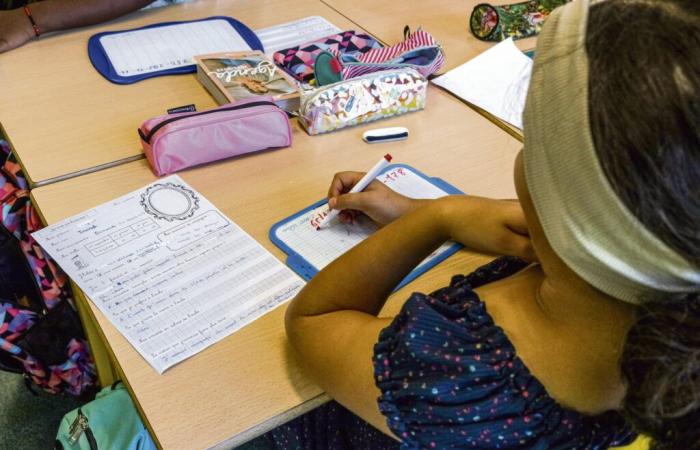The educational policy carried out in France since 2017 is bearing fruit, and they are bitter… if not unexpected. The international Timss survey (Trends in International Mathematics and Science Study) 2023, which measures the results of CM1 and 4 students every four yearse in mathematics and science, makes the implacable observation.
Published on Wednesday December 4, it not only confirms that France obtains among the worst results in the world, at a comparable economic level, in these two subjects. It also shows that our country remains one of the most unequal, both socially and gender-wise, in terms of educational results. And she notes that the situation has only deteriorated over the past four years – at least.
However, it is almost a cry of victory that the official press release from the Ministry of National Education utters: “Between 2019 and 2023, the scores of students attending school in France remain stable in mathematics and science. » Except that this stability is far below average.
15% of students do not reach the minimum level of understanding in maths
In CM1, the students' results in maths (484 points) place our country at the very bottom of the scale: just ahead of Chile, very clearly below the averages of the European Union (524 points) or the OECD (525 points). And far, very far from South Korea or Japan, which are close to 600 points, and almost as far from Turkey, England, Romania…
In science, the picture is similar. In our country, the survey also notes, 15% of students in mathematics and 12% in science do not reach the minimum level of understanding, located at 400 points, while in the EU, on average 7% of students are in this case. In 4ethings are not improving: France is not far away, here either, from winning the dunce cap with 479 points in maths and 486 points in sciences, when the EU/OECD averages stand at 507 and 509 points.
Experts from Depp (evaluation, foresight and performance department of the ministry) note, in their Timss 2023 analysis notes, that France's results are not more brilliant in terms of inequalities. For CM1, the gaps between students from very advantaged families and those from very disadvantaged families “place France among the most unequal EU and OECD countries” in the field of mathematics. When we move to level 4e on the other hand, these gaps are narrowing and place France “in the average of OECD countries”.
Gender inequalities are getting worse at school
Gender inequalities are not forgotten. And they are getting worse, not only compared to the previous survey in 2019, but also compared to 2015. In mathematics, CM1 girls were 6 points behind boys in mathematics in 2015. In 2019, it increased to 13 points and in 2023, it stands at 23 points.
This time, our country is no exception since this difference between girls and boys in math is a constant in all the countries studied (with the exception of Romania). But “it is in France that the gap is the largest”insists the Depp note. In fourth grade, the situation is barely less serious: in 2019, girls were 8 points behind boys in maths, this rose to 12 points in 2023, while in science girls and boys obtain comparable scores.
It should be noted in passing that Timss 2023 establishes that, in the EU, French students are those who spend the most hours doing maths, in the name of the famous “fundamentals”… while having the worst results. We can always brandish the effects of Covid to explain these generally catastrophic results. Except that the policy of opening schools at all costs, carried like a standard by the minister at the time, Jean-Michel Blanquer, was precisely supposed to allow French students to resist better.
This was not the case, we see. These results actually sign the overall failure of the educational reforms carried out since 2017, from the “mathematics plan” launched in 2018 to the splitting of CP and CE1 into priority education zones, including “reading, writing, counting”. The problem is elsewhere. No reform can bear fruit when, “at the same time”, we eliminate positions by the thousands, we refuse teachers (which Timss 2023 also notes) the continuing training they demand and the increases which would make the profession attractive again. .
The journal of free intelligence
“It is through extensive and exact information that we would like to give to all free intelligences the means of understanding and judging world events for themselves. »
Such was “Our goal”as Jean Jaurès wrote in the first editorial of l'Humanité.
120 years later, it hasn't changed.
Thanks to you.
Support us! Your donation will be tax-free: giving €5 will cost you €1.65. The price of a coffee.
I want to know more!






